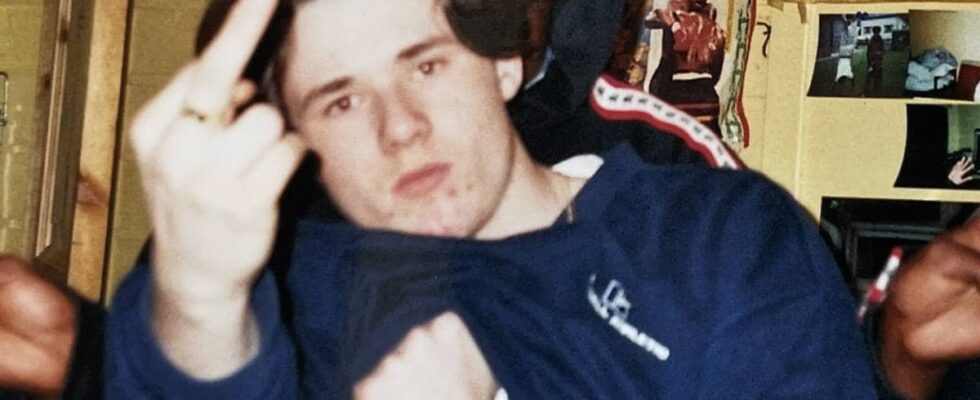He is excited and expectant. For the first time in 25 years, Frederik Svindland stands in the school yard at Heistad secondary school. The style is still rough and youthful. But the look is open and warmer than back then. The 38-year-old will meet the person who took the most important step in his life. Frederik meets the rector after 25 years. Stole and sold drugs Frederik Svindland (38) grew up in a tough youth environment in the district of Heistad in Porsgrunn. Frederik Svindland has written the book “Jævelunge”, based on the tough youth in Porsgrunn. Photo: Robert Hansen Everyday consisted of drugs, stealing and truancy from school. The notorious youth gang hung out daily at the center in Skjelsvik. – We went in and beefed things up. The shopkeeper chased us away. Once we ran after him with a broom. We just did shit, recalls Svindland. Svindland outside the center where he and his friends spent much of their time. Photo: Robert Hansen / news Pickpocketing and petty theft were to rapidly degenerate. – We were children who went from being petty criminals to committing serious crimes. At the age of 14, we were injecting amphetamines and Rohypnol. My parents were very worried. Seven of his old friends are now dead. Others struggle hard. He himself started a family and became a writer. Earlier this autumn, he came out with the novel “Jævelunge”, based on his tough youth. – I feel incredibly lucky and blessed. It was not a given that life would turn out like this. Many struggle at school It is still tough to be young in Norway. New figures show that sickness absence is sky high at upper secondary schools. Two out of ten students drop out. – It is serious and frightening, says Professor Marie-Lisbet Amundsen at the University of South-Eastern Norway. Marie-Lisbet Amundsen, professor at the University of Southeast Norway. Photo: Privat She has researched youth, school and crime for over 20 years. It can have major consequences later in life if young people leave school before they finish. For example, 9 out of 10 of the regulars in Norwegian prisons have dropped out of upper secondary school. Over 70,000 young adults between the ages of 20 and 30 are now completely out of school and work. In recent years there has also been an increase in youth crime in several places in the country. In January this year, the director of police expressed concern about increased violence and serious crime among minors. In 2023, 21,800 criminal offenses involving minors were prosecuted. This is an increase of 28 per cent from 2022, figures from the police show. For Frederik Svindland, the headmaster’s radical move was a turning point in his life. Touching reunion Much has changed since Svindland was at the school last. But the old brick building is still there. Tom Stormyr was the newly appointed headmaster at Heistad secondary school in 2000. It was a stroke of luck for the clueless 14-year-old. – He was the first adult to see me. I had no one in my life who were stable characters. I was hated by everyone. The headmaster’s office actually became like a little sanctuary. Back in the headmaster’s office The headmaster then shakes the wild teenager out of his familiar environment. He expels the 14-year-old from school, and sends him to Kjølne’s secondary school. Here he gained a completely new circle of friends. It changed everything. – It was actually cool to be good at school there! The good relationship The most important factor in getting children and young people back to school is a good relationship with a teacher, explains Professor Marie-Lisbet Amundsen, and refers to studies she has taken part in. – Then came a sense of mastery and friends. Photo: Robert Hansen / news The school must adapt to the children, not the other way around, the professor believes. – We need all the flowers in a flower meadow, but they need different care. Hunt for potential Headmaster Tom Stormyr also believes that the school must adapt to reality. – The parents have sent the best they have. We must hunt for the potential each individual student has. If not, it won’t work. Then there is no point in running a school, he believes. – It is potentially life-threatening to be in a classroom where you do not get anything done. You compare yourself to everyone else. And it has become much tougher with social media, says the principal. Photo: Robert Hansen / news Frederik Svindland was not feeling well about himself. – I couldn’t do a shit, and felt like I was a worthless loser and idiot, says Svindland. Now he is living proof that bad things can be turned into something good. – Everyone has the seed in them to become something good. As long as they are seen in time, he concludes and gives his old headmaster a big teddy bear hug. – You are a good man, Tom! Author Frederik Svindland: Svindland made his debut with the novel Pelargonia in 2016. For this he was nominated for Tarjei Vesaas’ debutant award. The author has also published the books Engelsk tåke and Dyrenes lykke. He recently published the book “Jævelunge”, a novel based on his tough upbringing in the district of Heistad in Porsgrunn. The names of the characters have been changed, but many of the events in the book are real. The book is written in the language he used in his youth, and is a tough and unvarnished story about growing up in a small place. This autumn he received the Bjørg Vik award in his own home town. Published 09.11.2024, at 11.41
ttn-69
– Felt I was a worthless loser – news Vestfold and Telemark – Local news, TV and radio

